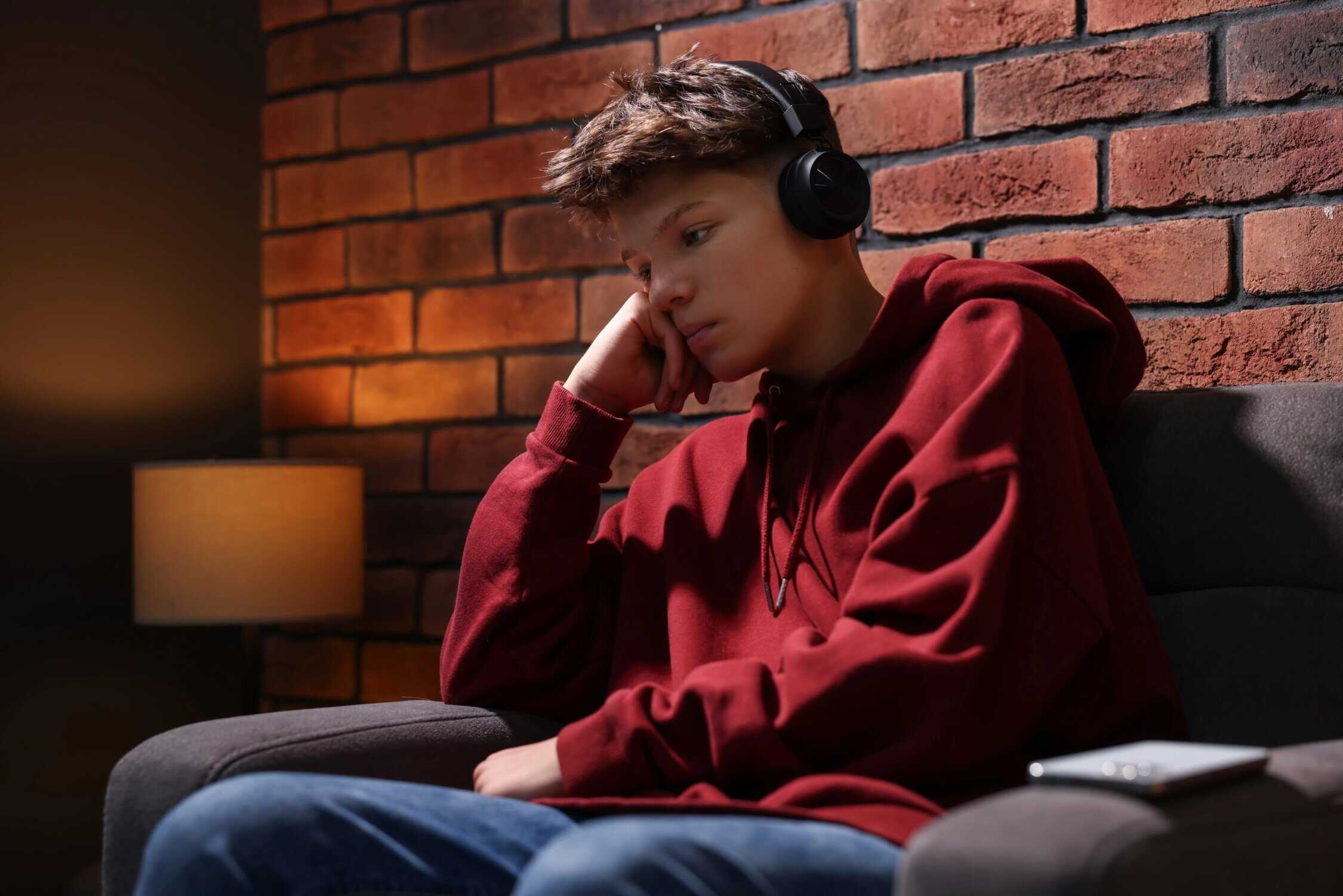Home | Teen Mental Health | Depression
Teenage Depression Treatment
Teenagers suffering from depression often lose their excitement and enthusiasm for the activities they used to enjoy, such as school, sports, and socializing with friends. If left untreated, severe depression can lead to other issues like substance abuse, eating disorders, and even suicidal thoughts.
Table of Contents
What is Teen Depression?
According to the National Institute of Mental Health, approximately one in five teens experienced at least one episode of major depression in 2021. All teenagers experience pain and loss at some point in their lives. And teens can be moody in general as they learn to cope with hormonal changes, first loves, school demands, and other pressures. These symptoms generally pass in a few days or weeks, depending on the circumstances. If they persist and impact your teen’s daily life, however, they could indicate major depression or another type of clinical depression.
Depressive Symptoms
Major depression in teens is often characterized by extreme and overwhelming sadness. But depressive symptoms can vary widely, and some are not as easy to spot. Potential signs of clinical depression in teens, when they persist for several weeks or more, may include:
- Anger and outbursts over trivial matters
- Feelings of hopelessness, worthlessness, or even guilt
- Irritability
- Losing interest in activities
- Difficult or nonexistent social relationships
- Worsening self-esteem
- Heightened self-criticism and inability to move past mistakes
- Fixation on rejection
- Constant reassurance seeking
- Difficulty focusing and making decisions
- Memory loss
- Inability to imagine a positive future
- Thoughts of suicide
- Lack of energy
- Sleeping too much or too little
- Changes in eating patterns
- Substance use
- Restlessness such as pacing or fidgeting
- Physical aches and pains without an obvious medical cause
- Worsening grades or episodes of skipping school
- Losing interest in personal appearance
- Self-harm — for example, cutting or burning
- Preoccupation with dying, which may escalate to a suicide plan or attempt
Recognizing these warning signs early is crucial. If your teen is showing several of these symptoms, especially self-harm behaviors or thoughts of suicide, it may be time to consider professional depression treatment. With the right combination of therapy, support, and care, adolescents can learn to manage their symptoms, reduce the risk of self-harm, and begin moving toward a healthier future.
Common Causes of Depression in Teens
It’s important to note that clinical depression is a type of mental illness. Societal pressures, such as friendships and school, can be difficult to handle, and teens may start to withdraw. But depression is a diagnosable mood disorder that isn’t caused solely by the challenges teens face.
Instead, depression in teenagers has the same root causes as depression in adults. These include:
- Genetics: People whose parent or grandparents struggles with depression, anxiety disorders, or other mental illnesses are at higher risk.
- Brain chemistry: Chemicals in the brain known as neurotransmitters play an important role in regulating mood. When these chemicals are out of balance, depression can occur.
- Early childhood trauma: Experiencing trauma early in life can alter later development, putting people at higher risk for depression.
Understanding the root causes is the first step, but getting the right help is just as important. Professional depression treatment gives teens the tools to manage symptoms, address underlying issues, and build healthier ways of coping as they grow.
Start Your Teen’s Healing from Depression
If your teen is showing signs of depression, Key Healthcare is here to help. Our adolescent depression treatment program provides compassionate, evidence-based care designed to support emotional healing and long-term well-being. Reach out today to take the first step toward a brighter future.
Types of Depression in Teens
Depression manifests in a variety of forms, and there is no one-size-fits-all explanation. Here are the most common types of depression among teens:
Major Depression
Also known as major depressive disorder, major depression is characterized by a depressed mood and a loss of interest and pleasure in everyday life. Because temporary mood swings are just a part of life, this type of depression is not diagnosed unless symptoms persist for at least two weeks. For most people with major depression, though, symptoms are pervasive and can last for months or years without treatment.
Persistent Depression
Persistent Depressive Disorder (PDD) is a form of long-term depression, also known as dysthymia, that is only diagnosed once symptoms have persisted for at least two years. While not as severe as major depression, PDD can interfere with relationships, schoolwork, and day-to-day activities for years on end.
Bipolar Disorders
Bipolar disorder consists of periods of mania or hypomania alternating with episodes of depression. Manic episodes are characterized by sleeping too little, talking excessively, and often engaging in reckless behavior. These drastic mood changes can often destroy relationships and make it challenging to study, work, or engage in social interactions.
Seasonal Affective Disorders (SAD)
Also known as seasonal depression, SAD is a form of depression that is tied to the weather. SAD most commonly occurs in the winter, as the days become shorter and the sunshine decreases. But some people experience summer-onset SAD, which can be even worse.
Situational Depression
Situational depression is often caused by stress and lasts for a brief period of time. It might be diagnosed as an adjustment disorder with a depressed mood. It usually manifests as a result of a traumatic incident or chain of events.
Depression Due to Other Causes
A wide variety of medical conditions could be responsible for your teen’s symptoms. These include premenstrual dysphoric disorder (PDD), various neurological disorders, and even side effects from some medications. It’s important to get a full physical and mental health workup before deciding that the symptoms are the result of a mood disorder. Mental health professionals know how to treat depression of all types and causes, but an accurate diagnosis is key.
Our goal in developing Key Healthcare was to create programs that give teens the guidance they needed to draw on their strengths and realize their potential to live fulfilling happy lives. Based on our own experiences, we believe that everyone has the ability to change if given the proper structure and connection.






Our goal in developing Key Healthcare was to create programs that gave teens the guidance they needed to draw on their strengths and realize their potential to live fulfilling happy lives. Based on our own experiences, we believe that everyone has the ability to change if given the proper structure and connection

Ryan Blivas & Evan Powell
Founders of Key Healthcare
Options to Treat Depression in Teens
Key Healthcare offers several different depression treatment options for teens. Each individualized treatment plan is carefully crafted by a mental health professional with the goal of long-term recovery. If you are interested in learning more about our treatment programs for adolescent depression, contact us today.
Medication Therapies for Adolescent Depression
Medications like selective serotonin reuptake inhibitors (SSRIs) are often necessary to address the chemical imbalances that contribute to depression. While these prescriptions can play an important role, treatment for teens goes beyond simply taking a daily pill.
Individual, Family, and Group Therapy
The most effective depression treatment plans combine medication with individual therapy, family therapy, and group therapy. These sessions give adolescents the chance to explore their emotions, build healthier communication patterns, and gain support from both professionals and peers.
Activity-Based and Talk Therapy Approaches
At Key Healthcare, we use both talk therapy and activity-based approaches. Many adolescents face struggles at school, at home, and in social settings. A mix of therapies helps them process their challenges and develop stronger coping skills to navigate life more confidently.
Intensive Outpatient Depression Treatment (IOP)
In our adolescent intensive outpatient program, teens visit our facility for 3 hours per day, 3 days per week. The program lasts 4-12 weeks, depending on individual needs. Your teen will participate in interpersonal therapy sessions, including talk therapies, that help treat depression by encouraging them to work through their challenges.
Partial Hospitalization Program (PHP)
Our PHP depression treatment program is more rigorous than the IOP. Teens live at home, but attend the program for 8 hours per day, 5 days a week. The PHP typically lasts for 3-4 weeks. The PHP is highly structured, but consists of the same types of therapies and treatment protocols as the IOP.
Teen Residential Depression Treatment Program
When teenagers are severely depressed, suicidal, or coping with multiple diagnoses, an inpatient residential program may be the best short-term solution. Key Healthcare’s teen residential treatment program, located in Malibu, California, lasts between 45 and 60 days. This program provides adolescents with the highest level of care, including 24/7 support.
It might feel like a big step, but remember why you're here—you’re looking for a way forward.
Teen Depression FAQs
Get answers to frequently asked questions about teenage depression.
How Do You Motivate A Depressed Teenager?
Motivating a teenager with depression is hard. However, the best things you can do are listen without judgment and simply be there. Make sure your teen feels that they are not alone in this journey. Your constant support, love, and presence can significantly help in the recovery process. At the same time, consult a trustworthy expert for advice on how to approach your teen.
What Age Group Has The Highest Rate Of Depression?
According to the Substance Abuse and Mental Health Services Association, adolescents aged 12 to 17 years old had a greater prevalence of a major depressive episode in the past year (19.5%) than adults (8.8%).
What Medication Is Used For Teenage Depression?
Both fluoxetine (Prozac) and escitalopram (Lexapro) are authorized, commonly prescribed antidepressant medications for adolescent depression. Discuss the advantages, risks, and potential side effects with your child’s healthcare provider. Also, discuss antidepressant treatment options with your teen before making a final decision. Remember that these medications work best when used in conjunction with a variety of therapies.
Request a Call
Is your teen struggling with mental health or substance use challenges?
Request a confidential call today – our team will walk you through the admissions process, treatment options, costs, and what to expect. Reaching out is a powerful first step toward a healthier future for your teen and your family.
"*" indicates required fields
Insurances we Accept
Healing and Hope at Key Healthcare
Adolescents facing depression, anxiety, or self harm need more than temporary solutions, they need compassionate care that addresses the root of their struggles. At Key Healthcare, our specialists provide evidence-based therapies, personalized treatment plans, and family support designed to help teens recover and thrive.
If your teen is showing signs of depression or anxiety, don’t wait to get help. Early intervention can make all the difference in their recovery and overall well-being.
Contact Key Healthcare today to speak with a caring professional and learn how our programs can support your family’s healing journey.
Sources
National Institute of Mental Health. (2023). Major depression. U.S. Department of Health and Human Services, National Institutes of Health. https://www.nimh.nih.gov/health/statistics/major-depression
Substance Abuse and Mental Health Services Administration. (2023). Key substance use and mental health indicators in the United States: Results from the 2022 National Survey on Drug Use and Health (HHS Publication No. PEP23‑07‑01‑006; NSDUH Series H‑58). Center for Behavioral Health Statistics and Quality, Substance Abuse and Mental Health Services Administration. https://www.samhsa.gov/data/sites/default/files/reports/rpt42731/2022-nsduh-nnr.pdf
If you are ready to get help for your child, we are here to help. Feel free to call us, email, or fill out our contact form to get started today. You can also verify your insurance to begin the process.
Check Insurance
Structure, support, and a path forward. See how programs at Key Healthcare help teens thrive.
Take the first step by verifying your insurance today and finding out what coverage options are available for your family. Our team will review your benefits and help you understand how to access the care your teen needs.
Medical Reviewer

Dr. Elnaz Mayeh PhD, LMFT
Share Program
Is your teen struggling?
Call today for a confidential conversation with a teen treatment specialist—we’re here to help.
Programs
Mental Health
Check Insurance
Check if your insurance will cover the cost of treatment.
"*" indicates required fields
- Your information is secure & protected by HIPPA.












